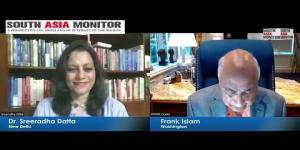Top Afghan peace negotiator meets Indian PM Modi
Abdullah Abdullah, Chairman of Afghanistan's High Council for National Reconciliation and also a top peace negotiator with the Taliban, met Prime Minister Narendra Modi and his National Security Advisor Ajit Doval here on Thursday

Abdullah Abdullah, Chairman of Afghanistan's High Council for National Reconciliation and also a top peace negotiator with the Taliban, met Prime Minister Narendra Modi and his National Security Advisor Ajit Doval here on Thursday.
While Abdullah, also a key leader for the intra-Afghan talks, is seen to have some proximity with the Taliban and Pakistan, his meeting with Modi marked a significant shift in India's position on the militant group.
India has traditionally been opposed to the Pakistan-backed Taliban in Afghanistan. Thousands of Afghans were given refuge in India when they fled the country due to oppression of the Taliban regime.
India has been in support of the democratically elected governments in Kabul. Prime Minister Modi and Afghan President Ashraf Ghani share a good relationship in the region.
After last year's presidential elections, both Ghani and Abdullah had claimed victory. The disputed election results created a political stalemate for months, which eventually ended up in a power-sharing arrangement between Abdullah and Ghani in May this year.
While Ghani remains the President, Abdullah heads the National Reconciliation High Council, a body that holds peace talks with the Taliban.
In June, a UN Security Council report had said that not only do the Taliban and the Al Qaeda continue to cooperate with each other, but Kashmir-specific Pakistani terror groups, Jaish-e-Mohammad (JeM) and Lashkar-e-Taiba (LeT), were sending their trainers to Afghanistan to carry out target assassinations.
The report added that around 6,500 Pakistani terrorists, including 1,000 from the JeM and LeT, are present in Afghanistan.
This was followed by a Pentagon report, which said the Afghanistan-Pakistan border region remains a sanctuary for the LeT, JeM, Al Qaeda, Al Qaeda in the Indian Subcontinent, Tehrik-i-Taliban Pakistan and IS-Khorasan.
Kabul has had a long troubled relationship with Islamabad because of Pakistani military's support to the Taliban.
Last month, Abdullah visited Pakistan where he announced that Afghanistan and Pakistan were on the threshold of a new relationship based on "mutual respect, sincere cooperation, and shared prosperity".
In his meetings with Pakistan Prime Minister Imran Khan and powerful military chief Qamar Javed Bajwa, Abdullah advocated that the neighboring countries in the region should cooperate with each other.
Though Pakistan's cross-border terrorism remains a concern for India, but Modi's meeting with Abdullah suggests that New Delhi was more than willing to back the democratically elected Ghani and Abdullah to arrive at a resolution with the Taliban.
The Intra-Afghan peace negotiations, which started last month between the Taliban and the democratically elected government representatives are going on in Qatar.
The talks aimed at ending the 19-year war have not led to any resolutions yet.
In Afghanistan, despite the efforts for peace, massive violence continues unabated.
The negotiations in Qatar follow a landmark peace deal between the US and the Taliban signed on February 29.
The US-led NATO forces, under the deal, will leave Afghanistan by May 2021 in exchange for an end to violence from the Taliban.
(IANS)



















Post a Comment